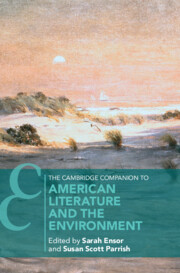Book contents
- The Cambridge Companion to American Literature and the Environment
- The Cambridge Companion to American Literature and the Environment
- Copyright page
- Dedication
- Contents
- Figures
- Contributors
- Acknowledgments
- A Note on the Cover Image
- Introduction
- Part I Environmental Histories
- Part II Environmental Genres and Media
- Chapter 6 The Heat of Modernity: The Great Gatsby as Petrofiction
- Chapter 7 Children in Transit / Children in Peril: The Contemporary US Novel in a Time of Climate Crisis
- Chapter 8 Meta-Critical Climate Change Fiction: Claire Vaye Watkins’s Gold Fame Citrus
- Chapter 9 Junk Food for Thought: Decolonizing Diets in Tommy Pico’s Poetry
- Chapter 10 Tender Woods: Looking for the Black Outdoors with Dawoud Bey
- Part III Environmental Spaces, Environmental Methods
- Notes
- Index
- Cambridge Companions to …
Chapter 9 - Junk Food for Thought: Decolonizing Diets in Tommy Pico’s Poetry
from Part II - Environmental Genres and Media
Published online by Cambridge University Press: 10 March 2022
- The Cambridge Companion to American Literature and the Environment
- The Cambridge Companion to American Literature and the Environment
- Copyright page
- Dedication
- Contents
- Figures
- Contributors
- Acknowledgments
- A Note on the Cover Image
- Introduction
- Part I Environmental Histories
- Part II Environmental Genres and Media
- Chapter 6 The Heat of Modernity: The Great Gatsby as Petrofiction
- Chapter 7 Children in Transit / Children in Peril: The Contemporary US Novel in a Time of Climate Crisis
- Chapter 8 Meta-Critical Climate Change Fiction: Claire Vaye Watkins’s Gold Fame Citrus
- Chapter 9 Junk Food for Thought: Decolonizing Diets in Tommy Pico’s Poetry
- Chapter 10 Tender Woods: Looking for the Black Outdoors with Dawoud Bey
- Part III Environmental Spaces, Environmental Methods
- Notes
- Index
- Cambridge Companions to …
Summary
This chapter traces how queer Indigenous poet Tommy Pico (Kumeyaay) has developed a critique of the “Ecological Indian” trope. While this critique begins most obviously in 2017’s Nature Poem – in which Pico boasts that he “would slap a tree across the face” – I show how he extends and refines this impulse in 2018’s Junk. Junk gestures toward dietary colonization – displacement from ancestral lands and the forced adoption of a Eurowestern diet – as a major force behind Indigenous health problems. But the book also satirizes pervasive trends such as urban “foodiesm” and gay men’s obsession with fitness – developments that, at first glance, seem to offer some corrective to those problems, but which ultimately exacerbate them by imagining eating as a matter of individual choice. Further, Pico resists the utopianism of decolonial dietary discourse, in favor of a perverse celebration of junk food. As I explain, the focus on future generations found in decolonial dietary discourse can be co-opted to pathologize “bad” eating habits and even link them to “bad” parenting. I conclude that Pico believes in the projects of dietary decolonization and Indigenous food sovereignty, but not in the affects or sensibilities they seem to require.
Keywords
- Type
- Chapter
- Information
- Publisher: Cambridge University PressPrint publication year: 2022



